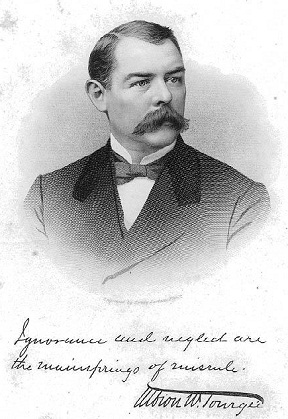A Fool's Errand
 A Fool's Errand, by Albion W. Tourgée, is the most revealing and popular fictional assessment of southern Reconstruction and the reasons it failed. Tourgée, an Ohioan who came to know the South through three different stints in the Union army, moved just after the Civil War to Greensboro, where he opened a plant nursery and law practice. By 1866 he had also entered politics as a Republican fully committed to freedmen's aid and black suffrage and an outspoken critic of Conservatives who opposed both. He served as a delegate to the state constitutional convention in 1868, and a year later he was elected a superior court judge. In both capacities, Tourgée personified what most white North Carolinians found to be the worst in carpetbaggery. Former governor Jonathan Worth once called him "the meanest Yankee who ever settled among us." His bold attempts to prosecute members of the Ku Klux Klan (KKK) made him a frequent target of their harassment.
A Fool's Errand, by Albion W. Tourgée, is the most revealing and popular fictional assessment of southern Reconstruction and the reasons it failed. Tourgée, an Ohioan who came to know the South through three different stints in the Union army, moved just after the Civil War to Greensboro, where he opened a plant nursery and law practice. By 1866 he had also entered politics as a Republican fully committed to freedmen's aid and black suffrage and an outspoken critic of Conservatives who opposed both. He served as a delegate to the state constitutional convention in 1868, and a year later he was elected a superior court judge. In both capacities, Tourgée personified what most white North Carolinians found to be the worst in carpetbaggery. Former governor Jonathan Worth once called him "the meanest Yankee who ever settled among us." His bold attempts to prosecute members of the Ku Klux Klan (KKK) made him a frequent target of their harassment.
Conservative government was restored to North Carolina in 1874, but it was only after a serious business setback and a failed bid for Congress in 1878 that Tourgée left the state after 14 years and returned to the North. By the end of the year, while living in New York City, he published two novels, Figs and Thistles and A Fool's Errand. The latter was a huge best seller, a result of its melodramatic and often suspenseful narrative and the variety of characters and situations that it portrayed. Tourgée entertainingly provided northern readers with a plausible and palatable explanation of the complexities of Reconstruction, as well as the futility of federal efforts to reshape southern society.
The KKK figured prominently in the novel, and Tourgée included vivid, thinly fictionalized accounts of two of its most infamous crimes: the 1870 murder of Union League and Republican leaders John W. Stephens in Yanceyville and Wyatt Outlaw in Graham. Interest in those cases, and challenges by southern critics to the credibility of Tourgée's portrayal of them, led him to compile a factual supplement recounting testimony (often of victims) of similar KKK atrocities throughout the South. He included this information as an appendix titled "The Invisible Empire" in the 1880 edition of A Fool's Errand.
Given the tremendous commercial success of A Fool's Errand, its publisher urged Tourgée to write other fictional accounts of the postwar South. The first, Bricks without Straw, appearing less than a year after its predecessor, enjoyed nearly as popular a reception. Together, they made Tourgée a celebrity who traveled the country as a lecturer, continued to write novels and essays, and remained a participant in Republican politics-often as an advocate of black rights and public education in the South.
References:
Richard Nelson Current, Those Terrible Carpetbaggers: A Reinterpretation (1988).
Otto H. Olsen, Carpetbagger's Crusade: The Life of Albion Winegar Tourgée (1965).
Additional Resources:
"Judge Albion W. Tourgee - Carpetbag Friend of the Race?" Cleveland Gazette 9, No. 15.November 21, 1891. http://dbs.ohiohistory.org/africanam/page1.cfm?ItemID=17274.
Tourgée, Albion W. "Is liberty worth preserving?" Chicago, Ill.:The Inter Ocean. 1892. http://memory.loc.gov/cgi-bin/query/r?ammem/murray:@field%28DOCID+@lit%28lcrbmrpt1720div1%29%29.
Dibble, Roy F. Albion W. Tourgée. New York: Lemcke and Buechner. 1921. https://archive.org/stream/albionwtourge00dibb#page/n5/mode/2up.
Royall, William L. New York: A Reply to "A Fool's Errand, by One of the Fools." New York: E. J. Hale and Sons. 1880. https://archive.org/stream/replytoafoolserr00roya#page/n7/mode/2up.
Image Credits:
"Print, Accession #: H.1937.18.2." E. G. Williams & Brother, artist. Charles L. Van Noppen, publisher. From the North Carolina Museum of History.
1 January 2006 | Inscoe, John C.